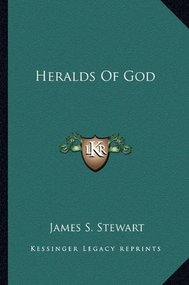 Stewart unabashedly demands that preachers see themselves as more than a talking head for 30 or so minutes on Sunday morning. He wishes to overcome the cultural “inclination to regard the preacher as the purveyor of religious homilies and ethical uplift” and replace it with its original intent, “the herald of the mighty acts of God” (16). His opening chapters reveal that preaching is an eternal art in the dual sense that it has been carried on by men to the present day since Christ walked the Earth, and that its impacts are eternal in the future! For preaching should revolve around one theme and one theme only, the saving Gospel of Jesus Christ. Stewart claims that “the basic message thus remains constant and invariable,” but in the face of an ever changing world “our presentation of it must take account of, and largely conditioned by, the actual world on which our eyes look out today” (11). This sets the stage for the rest of the book, which covers the means by which the Gospel is to be proclaimed. His style and authority feel timeless, putting modern authors to shame, as he rightfully reestablishes the critical importance of preaching the message of Christ “in and out of season.” Stewart first calls preachers to be bold with the Gospel, stating that “your task is to confront the rampant disillusionment of the day, and smash it with the Cross of Christ and shame it with the splendor of the Resurrection” (20). The reason for this boldness is because despite external appearances people are crying out for a “word from the Lord.” Thus, he states that “this is not time to be offering a reduced, milk-and-water religion” or a “a mild and undemanding half-Christianity.” Instead of continuing to “emasculate” the Gospel he demands that all preachers “Preach Christ today in the total challenge of His high, imperious claim” (26-27). Ultimately, Stewart states that “No preaching that failed to exalt Christ is worthy to be called Christian preaching” (61). Secondly, Stewart calls all people to the mission of God. He believes that all preachers ought “to summon men to share with Jesus in the great crusade which began at Calvary and Pentecost” until the whole earth is filled with the glory of the Lord. Wherever people resist the call, Steward states that we must object to rejection demanding that they “reflect on what it will feel like for any disciple to stand before Christ at last and say, 'The world mission of Your religion had no help from me!'” (31). Finally, Stewart also provides some incredibly practical matters for preaching because“in the age of broadcasting delivery is crucial, since people will not tolerate bumbling or pulpit voice when they're so used to professional speakers” (176). Of primary importance is the solution to the controversy over preaching's rightful place (or lack thereof) in the worship service. Here he claims that preaching is a form of worship since it fulfills Dr. William Temple's definition of worship: “To worship is to quicken the conscience by the holiness of God, to feed the mind with the truth of God, to open the heart to the love of God, to devote the will to the purpose of God” (73). After this he offers advice on: the length of a preaching series (no more than eight or nine, and six is ideal) (168), whether or not to speak from a manuscript (beginning preachers should wright out sermons in the beginning, but not preach from them) (177), and mannerisms and movement (be sparing, natural and intrinsic) (185). The one weakness that seemed to interfere with Stewart's communication is distance between the time that he wrote and modern readers of today. Often times Steward uses phrases or expressions that he expects his original audience to be culturally preconditioned to understand, such as “purple passages,” but have fallen out of usage by the time of a modern reading. Since this doesn't occur frequently, little can be done today about the language or word choice Stewart chose to utilize without violating the original text short of potentially inserting an editor's footnote to define or explain such terms.
0 Comments
Leave a Reply. |
AuthorBrett Yardley: Categories
All
Archives
January 2019
|

